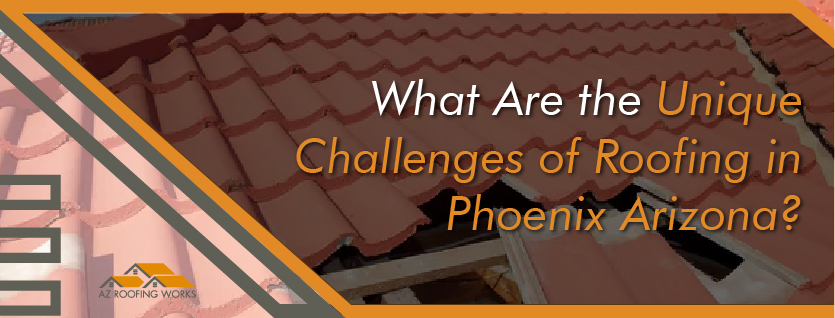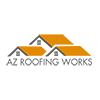What Are the Unique Challenges of Roofing in Phoenix, Arizona?
The average roof will last from 25 to 50 years.
However, this depends on the materials, maintenance level, and installation. Roofing problems can happen regardless of the job or contractors.
For example – in Hoboken, New Jersey, contractors often have trouble installing shingles during winter.
The ice and snow make their surroundings slippery. Roofing in Phoenix, Arizona, also comes with unique challenges.
Areas across the U.S. have distinctive obstacles when it comes to roof installations.
Keep reading to learn what makes roofs in Arizona different from other locations in the country.
The Heat
You know Phoenix can reach hundred-degree temperatures, but how does that affect your roof?
Well, ultraviolet radiation degrades roofing materials.
They fade, become brittle, and are striped their protective properties.
You end up with roofing that looks less vibrant and is more prone to cracking and leaks.
Heat contributes to expansion and contraction too.
During the day, shingles and tiles grow due to intense temperatures.
Think of a small-scale version of dough expanding in the oven.
During the night, when temperatures drop, roofing shrinks.
Over time, constant expansion and contraction may warp or fracture shingles and tiling.
Roofs in Arizona experience thermal stress as well.
Thermal stress occurs when temperature differences on the exterior and interior of your roof differ by too much.
The resulting strain weakens material integrity.
Arizona Heat Affects More Than Your Roof
It’s easier for excessive heat to penetrate your home through the roof.
While this technically isn’t an issue for the roof itself, it does make it harder to cool your house.
You may see higher energy consumption and electrical bills.
There are also concerns about whether Arizona roofing contractors can work much during the summer.
Last year’s heatwave left Phoneix suffering almost two months of 110-degree weather.
Many companies limited work hours last year to protect the workers.
It’s not unreasonable to assume this may be an issue in 2024.
The Rain
Another primary roofing challenge in the Valley of the Sun is the abundance of rain.
Arizona doesn’t receive as much rain as the Pacific Northwest (like Idaho and Oregon).
But Phoenix’s monsoon season can ravage your roof.
People compare monsoons and hurricanes often.
While they are similar, in that there is plenty of rain and wind, there is a key difference.
Namely, hurricanes are storms and monsoons are weather patterns.
Here is how it works.
During winter, wind flow in Arizona mostly travels from California and Nevada, or west and northwest respectively.
However, the wind comes in the south or southeast pattern during summer.
Specifically, wind picks up and moves moisture from the Pacific Ocean or the Gulf of Mexico.
Researchers aren’t sure which area is the source of moisture.
Excess moisture combined with Arizonan surface heating creates powerful thunderstorms.
How Water Harms Your Roof
All the water and wind can result in various roofing problems.
Water can find its way into openings like worn-away caulking and loose flashing.
Water sitting between the roofing and deck that doesn’t enter your house can cause mold and mildew.
For those who may not know, the roof deck is the wood frame base underneath the roofing materials.
If by some chance the wood doesn’t mold, it can still rot away due to the trapped moisture.
Roof rafters and timbers become unsafe and structurally unsound.
Water can also find its way into the attic.
The attics in Phoenix, Arizona, are more like crawl spaces than rooms, proper.
Still, they’re large enough that homeowners can often store items.
Moisture leaking inside may damage these objects, or worse yet, the attic itself.
Water can rot away the ceiling and floor, which can spread throughout your residence.
You may experience mold and mildew growth throughout the attic as well.
Water can even affect insulation by lowering its R-value.
Insulation R-value measures how well it keeps heat from leaving or entering the home.
The water can spread and ruin insulation down into your house, like in the living room and beyond.
Cellulose and fiberglass, the most common insulation types, also take a long time to dry.
Wet insulation becomes compressed, dirty, and moldy, stopping it from retaining or excluding heat.
Roofing and Wind Damage
High enough winds can strip asphalt tiles away from roofs.
While this is an issue for asphalt, clay tiles can withstand winds of over a hundred miles per hour.
Thankfully, monsoon winds that high aren’t too common in Phoenix, Arizona.
However, asphalt and clay tiles can still be harmed by the wind throwing heavy branches into shingles.
If the shingles don’t fall off, they suffer friction damage from branches blowing across the material.
Leaves and other debris can clog drainage paths and gutters.
The water eventually pools onto the roof, which may buckle under the extra weight.
Standing water can leak underneath the material and cause the deck to rot.
Attic Ventilation
Attic ventilation can cause complications for roofing in Phoenix, Arizona.
Ventilation is a series of exhaust and intake mechanisms used to promote airflow around homes.
Attic ventilation is especially vital because it takes less effort to keep things cool.
Airflow in your attic can reduce energy costs and extend your roof’s lifespan.
For example, a hot attic means hot underlayment.
Roof underlayment is the layer between the shingles and decking.
Once this becomes too hot, it turns brittle and unstable for shingles or tiles to lay on.
A hot attic is also humid and damp.
Too much humidity can turn into condensation when temperatures get low enough.
Excess water is bad for storage and can weaken your attic walls, ceiling, and roof.
The Struggles of Roofing in Phoenix, Arizona
Roofing in Phoenix, Arizona, comes with unique challenges.
The heat can compromise materials and make things dangerous for Arizona roofing contractors.
Rain can rot roof decking and attic insulation.
Poor attic ventilation can harm roofing underlayment.
What do you do with all these complications affecting your roof and home?
AZ Roofing Works has provided quality roofing for Phoenix Valley residents since 2013.
Contact us if you need expert repairs to your commercial or residential property.
Seeking a reliable Mesa, AZ roofing contractor? Navigate Phoenix’s unique challenges with AZ Roofing Works. Contact us today, either online or call our office directly, our friendly staff members are standing by at (602) 283-3383.





